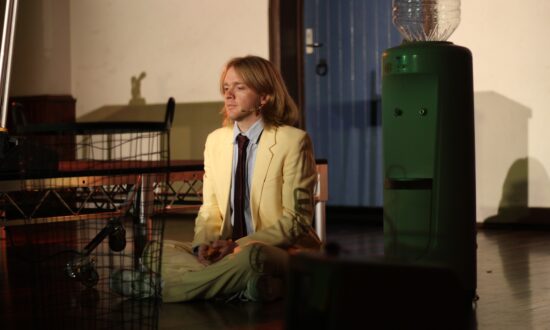Online sex worker Lulu is in the mood to chat.
Between performing specific acts at the request of tipping clients, fielding video calls from customers, and introducing the audience to the chatbot that helps run her business (the AI, Lulu points out, is about as genuine as she is), Lulu reminisces.
At first, her stories gel neatly with the “I’m just a girl” persona Lulu adopts for clients. But slowly, as she shifts from giggly and unlikely renderings of losing her virginity to much more realistic recollections of early jobs and relationships, the Lulu mask slips.
What emerges are glimpses of Lauren – the person Lulu has been invented to protect.
Written and performed by Ellen Graham and directed by Zola Allen, the precept of Be a Doll, Won’t You? promises catharsis for femme-presenting people who have found themselves reduced to empty flesh by the gaze of others.
But that happens only intermittently.
Graham is an undeniably charismatic and well-balanced performer, and Allen’s direction is generally successful in helping audiences navigate between Lulu as seen by clients, Lulu as a twisted kind of self-reconstruction and a reluctantly still-present Lauren.
What hampers both director and actor is the script. While it sparkles with some resonant scenes, particularly those when Lauren parallels her treatment as a sex worker with her treatment as a hospitality and retail worker, it is largely unfocussed.
Moments of real insight are skidded over. A client asks Lulu to act out a fetish, and before she has time to respond they quickly descend into a spiral of self-recrimination. Handled properly, it could have nodded at the fissures in masculinity and problems with self-hate that contribute weightily to misogyny. Instead, the scene slides by without the chance for further reflection.

Get InReview in your inbox – free each Saturday. Local arts and culture – covered.
Thanks for signing up to the InReview newsletter.
Alongside the patchy script, the decision to lean heavily on audience participation distracts from the show’s purpose. For a niche Fringe show, where audiences are likely to be small, audience participation is already at risk of causing more embarrassment than engagement. This danger was compounded by the way Allen and Graham use the tool. What were they trying to say by making the audience complicit in objectifying Lulu? From watching the show, it’s not clear.
Much more thought was dedicated to developing the closing scenes of the show, in which Lulu makes a transformation – becoming, in a way, the two-dimensional version of herself all her clients believe her to be. The nature of this transformation is interesting and quite possibly prescient, but the power of it is blunted by the unevenness of what came before.
Be a Doll, Won’t You? is playing at The Breakout at The Mill until March 5.
Read more 2023 Adelaide Fringe stories and reviews on InReview here.
Support local arts journalism
Your support will help us continue the important work of InReview in publishing free professional journalism that celebrates, interrogates and amplifies arts and culture in South Australia.
Donate Here




